Atoms
Atoms are the basic building blocks of matter. Everything in the universe, from a tiny grain of sand to the massive stars, is made up of atoms. Atoms are incredibly small, with a diameter of about 0.1 to 0.5 nanometers.
Structure of an Atom
Atoms consist of three main subatomic particles: protons, neutrons, and electrons.
- Protons: Positively charged particles located in the nucleus of the atom.
- Neutrons: Neutral particles located in the nucleus of the atom.
- Electrons: Negatively charged particles that orbit around the nucleus in specific energy levels or shells.
Atomic Number and Mass Number
The atomic number of an atom is determined by the number of protons it contains. The mass number is the sum of the protons and neutrons in the nucleus of an atom.
Isotopes
Isotopes are atoms of the same element that have the same number of protons but different numbers of neutrons. This results in variations in their mass numbers.
Electron Shells and Energy Levels
Electrons occupy specific energy levels or shells around the nucleus. The first shell can hold up to 2 electrons, the second shell can hold up to 8 electrons, and the third shell can hold up to 18 electrons.
Study Guide
Here are some key points to remember when studying atoms:
- What are the three main subatomic particles and their respective charges?
- How is the atomic number of an atom determined?
- What is the difference between the atomic number and the mass number of an atom?
- What are isotopes, and how do they differ from each other?
- How do electrons occupy energy levels or shells around the nucleus?
Understanding the structure and properties of atoms is fundamental to the study of chemistry and biology. Mastery of these concepts will provide a solid foundation for further exploration of atomic interactions and chemical reactions.
[Atoms] Related Worksheets and Study Guides:
.◂Biology Worksheets and Study Guides High School. Nucleic acids and protein synthesis
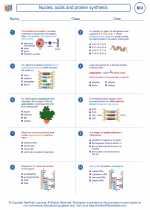
 Worksheet/Answer key
Worksheet/Answer key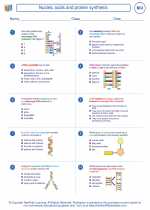
 Worksheet/Answer key
Worksheet/Answer key
 Worksheet/Answer key
Worksheet/Answer key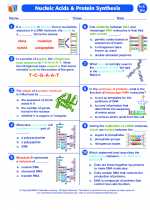
 Vocabulary/Answer key
Vocabulary/Answer key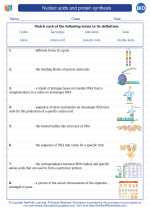
 Vocabulary/Answer key
Vocabulary/Answer key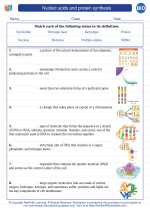
 Vocabulary/Answer key
Vocabulary/Answer key
